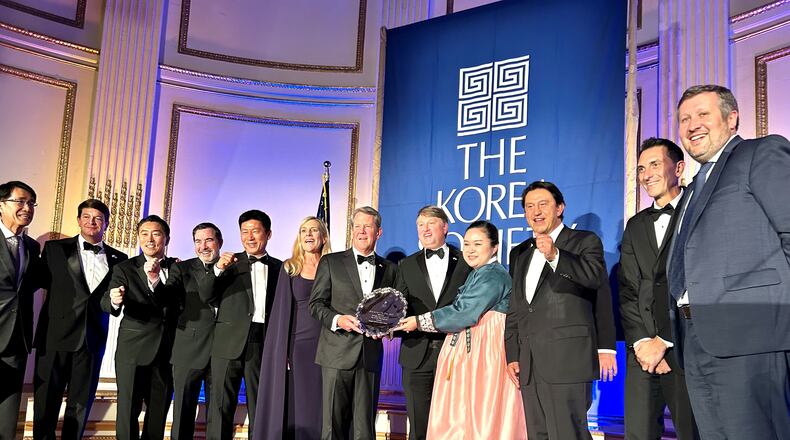NEW YORK — For the past three years, Georgia has announced record-breaking levels of corporate investment and a job creation surge, fueled in no small part by billions of dollars from Korean companies like Hyundai Motor Group for manufacturing in the Peach State.
On Wednesday night, a prominent diplomatic organization that advances relations between the U.S. and Korea recognized Georgia for its deepening economic ties with the rising Asian nation.
At a gala in a gilded ballroom of Manhattan’s famed Plaza Hotel, The Korea Society recognized the Georgia Department of Economic Development with the Gen. James A. Van Fleet Award, its highest honor. Van Fleet, a founder of The Korea Society, was the commander of the U.S. Eighth Army and leader of international forces during the Korean War.
Gov. Brian Kemp, who accepted the award on behalf of the state, noted how Georgia’s economic alliance with South Korea started with humble beginnings. Korea opened a consular office in Atlanta in 1976. About a decade later, Georgia opened a trade office in Seoul. It wasn’t until 1996 that Georgia landed its first major Korean manufacturer in Covington.
“And we’ve never looked back,” he said. Those initial steps proved pivotal in landing the Kia Motors plant in West Point, which reignited the auto industry in Georgia. Kia’s success would later help Georgia land the $7.6 billion Hyundai Motor Group electric vehicle and battery factory near Savannah, the state’s largest-ever economic development project.
In the past decade, Korean investment in Georgia has totaled some $23.6 billion, plus tens of thousands of jobs. Georgia has one of the largest Korean American populations in the U.S., and Korea has also emerged as one of Georgia’s top trade partners.
“Together, Georgia is leading alongside Korea in the areas of automotive manufacturing, EV and battery production and energy innovation as we establish a new supply chain in the U.S. from scratch,” Kemp said. “Together, we are at the forefront of the new economic revolution.”
Security cooperation and trade have helped Korea emerge as a global economic power and an important ally to the U.S. in a region that includes geopolitical rivals such as China and North Korea. This year also marks the 70th anniversary of the landmark U.S.-Republic of Korea security alliance.
Wednesday’s celebration came on the sidelines of the U.N. General Assembly, which jammed New York with diplomats, government leaders, businesspeople and journalists.
Past recipients of the Van Fleet Award include former U.S. Presidents Jimmy Carter, George H.W. Bush and George W. Bush. Georgia is the first U.S. state to receive the honor. The Korea International Trade Association also was recognized Wednesday with the Van Fleet Award.
‘So much more opportunity’
Multiple Georgia governors have visited Korea, from George Busbee to Sonny Perdue to Nathan Deal. Kemp made Korea his first overseas visit as governor, emphasizing the importance of the partnership.
Kathleen Stephens, chair of The Korea Society and a former U.S. ambassador to the nation, called the growth of Korean investment in the South, and Georgia in particular, “extraordinary.”
She recalled when Kia opened in West Point in 2009, as Georgia was shaken by the Great Recession, she saw signs in yards that read “Thank you, Jesus, for bringing Kia to our town.”
Korea was also the source of Georgia’s first major investment in EVs when SK Innovation built a battery plant in Jackson County, northeast of Atlanta. Hyundai would later follow with its EV and battery “Metaplant,” which is expected to employ 8,500 in a joint venture with fellow Korean giant LG Energy Solutions.
Georgia and local governments wooed Hyundai’s Metaplant with a record-breaking incentive package valued at $1.8 billion in tax breaks and other inducements.
Credit: J. Scott Trubey
Credit: J. Scott Trubey
A unit of SK, known as SK On, has since linked up with Hyundai to announce a $5 billion battery plant in Bartow County and numerous Hyundai suppliers are racing to build factories to serve the Hyundai investments.
On Tuesday, Hyundai announced a partnership with Georgia Tech to collaborate on EV battery and hydrogen fuel-cell technology. The Metaplant, could help pave the way for the state’s first network of hydrogen-powered tractor-trailers and commercial vehicles. The technology, while novel in the U.S., is used at other Hyundai factories.
The U.S. makes up about a quarter of the sales for Hyundai Motor Group and its Hyundai, Genesis and Kia brands. Electrification is a vital part of Hyundai’s growth strategy in the U.S. and globally.
The company has said it is ahead of its planned early 2025 start of production at the Metaplant, and manufacturing could begin later next year.
U.S. production would allow Hyundai, Genesis and Kia EVs to again qualify for $7,500 tax credits for buyers under federal law. The automaker’s EVs once qualified for the credits, but new domestic manufacturing requirements were instituted in the Inflation Reduction Act that made Korean-made models ineligible.
That has been a sticking point between Hyundai and Korean officials and the Biden administration. Though the company supports U.S. subsidies for EVs, Hyundai had already committed to building its Metaplant in Georgia before the legislation was adopted and the company had counted on its existing Korean-built fleet qualifying for subsidies until its U.S. factory could open.
About the Author
Keep Reading
The Latest
Featured





